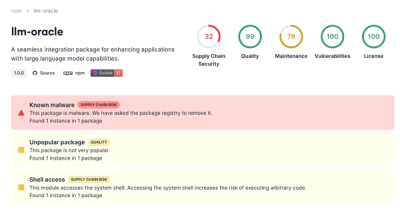
Security News
Dutch National Police Disrupt Redline and Meta Malware Operations
Dutch National Police and FBI dismantle Redline and Meta infostealer malware-as-a-service operations in Operation Magnus, seizing servers and source code.
The nocache package is a middleware for Node.js applications that sets headers to disable client-side caching. This is particularly useful for ensuring that sensitive or frequently updated content is not stored in the user's cache, thereby enforcing content freshness and enhancing security.
Disabling Caching
This code demonstrates how to use the nocache middleware in an Express application to disable client-side caching for all routes. By calling `app.use(nocache());`, all responses from the server will include headers that instruct the browser not to cache the content.
const express = require('express');
const nocache = require('nocache');
const app = express();
app.use(nocache());
app.get('/', (req, res) => {
res.send('Hello, World!');
});
app.listen(3000, () => {
console.log('Server is running on port 3000');
});Helmet is a collection of 14 smaller middleware functions that set HTTP response headers. One of its components, `helmet.noCache()`, offers similar functionality to nocache by setting headers to disable client-side caching. Helmet provides a broader range of security features beyond just disabling caching, making it a more comprehensive security solution.
The cache-control package allows for fine-tuned control over the cache behavior of Node.js applications by setting the `Cache-Control` HTTP header. While nocache focuses on disabling caching altogether, cache-control offers more granular control, enabling developers to specify exactly how and when their content can be cached.
It's possible that you've got bugs in an old HTML or JavaScript file, and with a cache, some users will be stuck with those old versions. This will (try to) abolish all client-side caching.
const nocache = require('nocache')
app.use(nocache())
This sets four headers, disabling a lot of browser caching:
Cache-Control: no-store, no-cache, must-revalidate, proxy-revalidatePragma: no-cacheExpires: 0Surrogate-Control: no-storeCaching has performance benefits, and you lose them here. It's also possible that you'll introduce new bugs and you'll wish people had old resources cached, but that's less likely.
2.1.0 - 2019-05-05
Changes in versions 2.0.0 and below can be found in Helmet's changelog.
FAQs
Middleware to destroy caching
The npm package nocache receives a total of 2,230,571 weekly downloads. As such, nocache popularity was classified as popular.
We found that nocache demonstrated a not healthy version release cadence and project activity because the last version was released a year ago. It has 1 open source maintainer collaborating on the project.
Did you know?

Socket for GitHub automatically highlights issues in each pull request and monitors the health of all your open source dependencies. Discover the contents of your packages and block harmful activity before you install or update your dependencies.

Security News
Dutch National Police and FBI dismantle Redline and Meta infostealer malware-as-a-service operations in Operation Magnus, seizing servers and source code.

Research
Security News
Socket is tracking a new trend where malicious actors are now exploiting the popularity of LLM research to spread malware through seemingly useful open source packages.

Security News
Research
Noxia, a new dark web bulletproof host, offers dirt cheap servers for Python, Node.js, Go, and Rust, enabling cybercriminals to distribute malware and execute supply chain attacks.